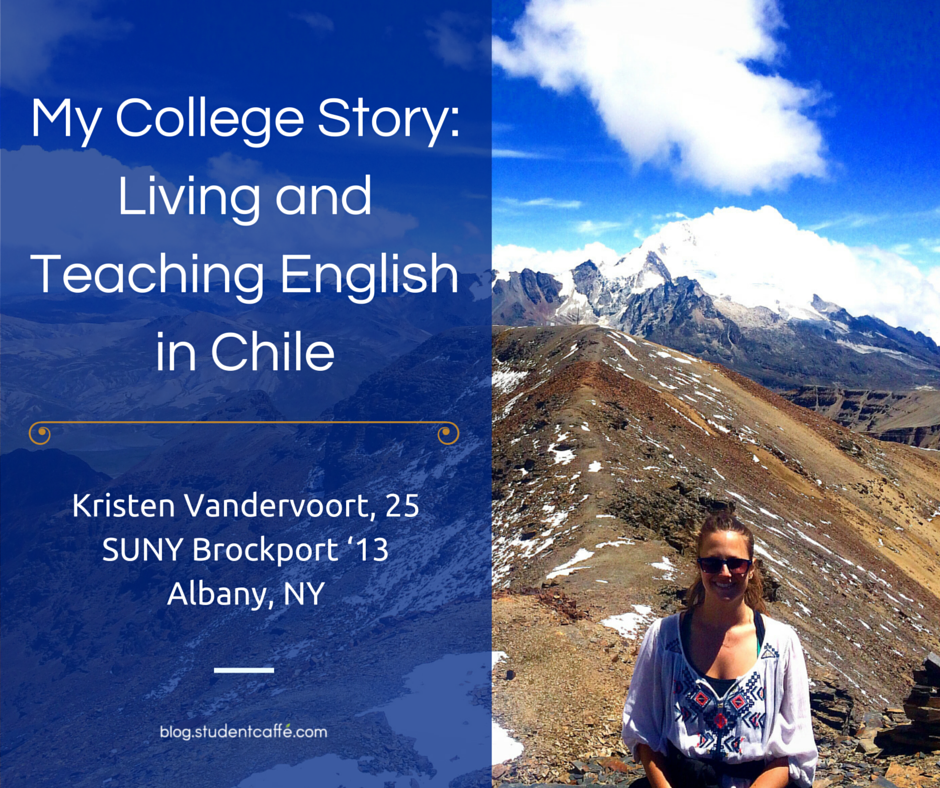
Kristen in Bolivia (Kristen Vandervoort)
Kristen Vandervoort double-majored in Spanish and psychology at SUNY the College at Brockport. During her undergraduate career, she spent two summers abroad, one studying at Universidad Internacional in Mexico and the other at Universidad Viña del Mar in Chile. After graduation, she moved to Santiago, Chile, and enrolled in a TEFL (Teaching English as a Foreign Language) certification course. Now, almost two years later, Kristen has taught at a language institute, freelanced around the city, and checked many things off of her bucket list!
Q. What do you feel were the benefits of a summer abroad instead of a full semester abroad?
A summer program allowed me to complete the requirements for my Spanish major early and gave me time to take on a second major and take some interesting electives. The class sizes abroad were much smaller than a normal college class, so I had a very individualized learning experience. It was also exciting to spend a summer immersed in another language and culture!

A weekend getaway in northern Chile (Kristen Vandervoort)
Q. How did your study abroad experiences influence your career?
After doing two short study abroad programs, I knew I wanted to live abroad again for a significant amount of time. Since I was a foreign language major, I knew living in a Spanish-speaking country would be the best way to improve my language skills. I fell in love with Chile during my summer abroad and knew it would be a great place to return to live. English teaching is a great way to experience living and working in a foreign country.
Q. Between moving away from home and committing to a long-term stay in Chile, it’s safe to say that this was not an impulsive decision. What were the steps you took in deciding to enroll in a TEFL certification course and move to Santiago?
There are many different ways to become TEFL certified. There are online courses available, as well as on-site courses in the United States and abroad. I knew I wanted to take an on-site course abroad because I did not study education. I wanted the experience of a teaching practicum during my training. Through my connections at Brockport, I knew two people who participated in the Bridge IDELT certification program in Santiago and had positive experiences. I decided this was the right program for me.
Although I loved Mexico, I knew I wanted to return to Chile to live and work. I moved to Santiago about a year and a half after graduating from Brockport—that time in between was spent working at various jobs saving as much money as I could for this experience.
Q. After completing the certification, you taught at an institution. Can you explain the opportunity and offer advice to students interested in teaching abroad?

A volcano in southern Chile (Kristen Vandervoort)
In Santiago, most of the teaching opportunities are teaching adult business English classes at language institutes. This means you will travel to several different offices per day and give classes to the employees. The language institutes have contracts with different companies, so the students (employees of the company) receive free English classes (paid for by their companies). The companies pay the language institutes for classes, and the language institutes pay the teachers. The teachers are paid on an hourly basis.
It’s important to know what type of demographic you are interested in teaching before deciding on a location. It is also important to research the qualifications required for your interest. For example, in Santiago, a job at a language institute typically only requires a TEFL certification; however, a job teaching children at a school usually also requires a teaching certification or a degree in education from a university.
Q. After leaving your teaching job with the language institute, you began freelance work. How have you been able to promote your services?
In Santiago, most English teachers promote their services on a website similar to Craigslist. I have also gotten students from posting ads in various Facebook groups intended for university students or people applying to study in an English-speaking country. Additionally, with time, you start to get students through word of mouth and recommendations.

A celebration after Chile won the Copa America (soccer championship) in 2015 (Kristen Vandervoort)
Q. What precautionary advice would you give for someone pursuing freelance teaching?
Make sure you know your market! I worked at two different language institutes for over a year and taught some freelance classes on the side, so I understood the demand for English classes in Santiago and knew I could make it on my own teaching freelance.
Q. How has freelancing benefited you?
There are so many ways freelancing has benefitted me! Financially, you can set your own rates per hour, which are typically higher than the average English institute in Santiago pays per hour. I love having the freedom and flexibility to create my own schedule each week. It has also helped keep me accountable; since I am my own boss, I am responsible for obtaining new students, organizing my schedule, planning lessons, making sure I’m getting paid, and all of the in-between things you don’t need to think about when working for a company.
Q. What do you enjoy most about teaching? Do you have a favorite memory?
My favorite type of class to teach is a preparation class for a special kind of standardized test. This test is meant for nonnative English speakers looking to work or study in an English-speaking country. The test measures their language skills (listening, reading, writing, and speaking) to make sure they could function in an English-speaking work or university environment. The types of students who take this test are very determined, and they typically have been dreaming about living in another country for a long time. I can relate to them because I also dreamt of living abroad for a long time. I love being a part of their journeys and being able to help them achieve these dreams.

View of Santiago (Kristen Vandervoort)
My favorite memories would have to be from my TEFL course. It was a month-long intensive class with a teaching practicum with real students. My other classmates and I were very close, and I have a lot of great memories from our practice classes. We learned how to teach through a lot of trial and error. A language barrier and inexperienced teachers can lead to some hilarious misunderstandings!
Q. What are the largest difficulties of your students and what advice do you give them?
English is a global language, and the main language of the business world. For many students, English is a necessity for their jobs. Students understand the importance of English, but unfortunately, if they did not begin learning English at a young age, it is very difficult to learn as an adult. I try to encourage them to soak in as much English as they possibly can, not only through classes, but through listening to music and podcasts, watching TV shows and movies, as well as reading.
Q. What do you plan to do next? Has your decision been influenced by what you have experienced teaching English?

View of San Pedro, Chile (Kristen Vandervoort)
I am actually going to India in November for a month-long yoga teacher training course. I plan to come back to Santiago after and continue teaching English, as well as begin teaching yoga to other expats. Teaching English has helped me realize that not only do I enjoy teaching, but that it’s also not necessary to work a “traditional” nine-to-five job in order to make a living.
Q. What advice do you give to others interested in teaching abroad?
Definitely do it! But make sure you know what you’re signing up for. Research the realities of teaching English in the country that you’re interested in, because it varies. Here in Santiago, most of the jobs are for teaching adults; however, in China and Korea, for example, you would most likely be teaching children. Also, make sure to understand the cost of living in the country, average salaries, quality of life, etc. Knowing the average pay for an English teacher in that country is important so that you can know if you should save money before leaving or not. It is a very unique and rewarding experience that I would definitely recommend!
-
My College Story: Figuring It out Along the Way
-
My College Story: The Possibilities of an English Degree
-
My College Story: Making the Most of Community College
-
My College Story: Auditioning for College Acting Programs
-
My College Story: How Theater Turned into Business
-
My College Story: Becoming a Police Officer
-
My College Story: Serving in the Peace Corps after Graduation
-
My College Story: Expanding a Study Abroad Experience
-
My College Story: Attending a Women’s College
-
My College Story: The Importance of Studying Abroad
-
My College Story: Student and CEO
-
My College Story: From Student to Teacher

